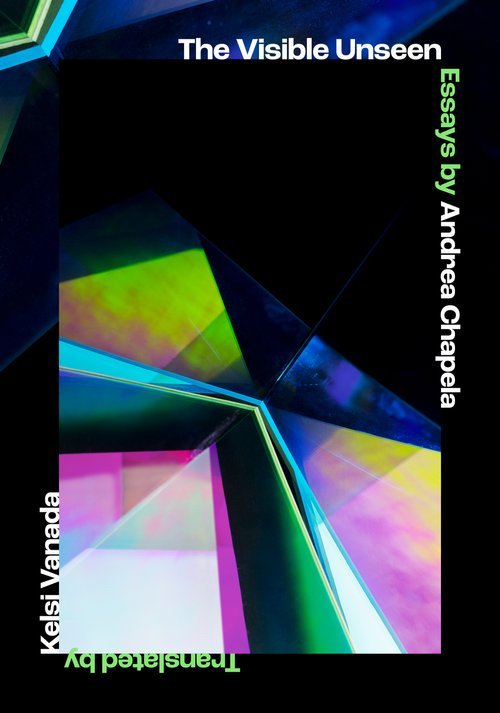Grados de miopía
Andrea Chapela
ESSAY | 2019 | 126 pages
Winner of the National Joven José Luis Martínez Prize
Andrea Chapela, one of Granta’s Best Young Spanish-Language Novelists of 2021, breaks down literary and scientific conventions in this prize-winning collection of experimental essays exploring the properties and poetics of glass, mirrors, and light as a means of understanding the self.
In powerful, formally inventive essays, The Visible Unseen disrupts the purported cultural divide between arts and science. As both a chemist and an award-winning author, Chapela zeros in on the literary metaphors buried in the facts and figures of her scientific observations. Through questioning scientific conundrums that lie beyond the limits of human perception, she winds up putting herself under the microscope as well.
While considering the technical definition of glass as a liquid or a solid, Chapela stumbles upon a framework for understanding the in-between-ness of her own life. Turning her focus toward mirrors, she finds metaphors for our cultural obsessions with self-image in the physics and chemistry of reflection. And as she compiles a history of the scientific study of light, she comes to her final conclusion: that the purpose of description—be it scientific or literary—can never be to define reality, only to confirm our perception of it. Lyrical, introspective, and methodical, The Visible Unseen constructs a startling new perspective from which to examine ourselves and the ways we create meaning.
RIGHTS: spanish TIERRA ADENTRO | world english RESTLESS BOOKS | spanish audio SCRIBD
“Making an impressive nonfiction debut, award-winning fiction writer Chapela brings the perspective of a poet to three lyric essays that probe the act of seeing and the challenge of communicating what is perceived. (...) Philosophical meditations graced by radiant prose.”
“Above all else, this essay is about the hidden transformations that surround us. It talks about glass (meaning what allows us to see), mirrors (meaning what allows us to see ourselves), and light (the vehicle for sight and the metaphor for truth, understood as the illumination of knowledge). Her method is exchanging lyrical doubt with personal experimentation, allowing knowledge to become a metaphor and everyday experiences to mark the course of curiosity.”
“Art and science definitely mix—don’t let anyone tell you otherwise...Many of the essays are experimental in form, so get ready for a challenging, thought-provoking tumble into the mysteries of the human heart and the physical world.”
“The Visible Unseen is a wonderful category-defying book. Andrea Chapela writes with mathematical elegance, poetical precision, and wit. Her intimate family vignettes blend with a Borgesian knowledge and regard for science. This lucid, beautiful book is an experiment where one eye sees with the vision of a philosopher and the other sees with the vision of a physicist, a biologist, and a chemist. The Visible Unseen is a lyrical laboratory of thinking and feeling. It’s an uncanny memoir of inner and outer perceptions.”
“Andrea Chapela lends us her eyes—the clear, intimate gaze of a chemist and writer—to help us delve into the matter that we are made of and the mysteries surrounding us. Literature and science merge in the substance of these essays—these wise, beautiful, soulful, astonishing experiments.”
“Andrea reflects on the nature of glass, mirrors, and lights without letting reason compete with metaphors—they both flow freely between anecdotes, hard facts that come and go, and simple experiments that at times reveal more about the author’s intimacy than about the order of particles.
(...)
Language is the filter through which the paths of both science and literature cross, and in each one she accepts at least two approaches: a way of giving order to chaos, or a series of statements carved in stone that must be broken down and reconstructed. Despite their formal differences, there’s always a point where, in order to translate their discoveries, scientists resort to similes. Therefore, the words selected to deliver their discovery are as relevant as those in a poem. (...) Perhaps the easiest thing is to amplify the metaphor and say that Andrea Chapela, like light, possesses a dual nature that in her case is torn between science and literature. Perhaps we should all lean into it a little in order to better understand the beauty that surrounds us, now that we need it so much.”
BY ANDREA CHAPELA:
Todos los fines del mundo
FICTION, 2025
Ansibles, perfiladores y otras máquinas de ingenio
STORIES, 2020
Un año de servicio a la habitación
STORIES, 2019
Grados de miopía
ESSAYS, 2019
Vâudïz
YOUNG ADULT, 2015


